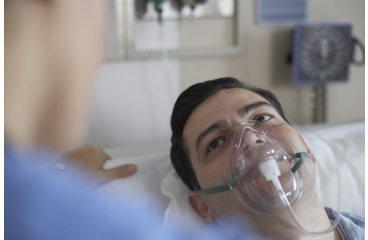Arterial Blood Gases (ABG) Test: About This Test
What is it?

An arterial blood gases (ABG) test is a blood test. It measures the acid-base balance (pH) and the levels of
oxygen and carbon dioxide in the blood. It uses blood drawn from an artery. This is where the levels of oxygen
and carbon dioxide can be measured before they enter body tissues.
Why is this test done?
An arterial blood gases test is done to check for severe breathing and lung problems. The test also checks
how well treatments for lung problems are working. And the test can look for changes in how well your lungs,
heart, or kidneys are working.
How do you prepare for the test?
-
If you take a medicine that prevents blood clots, your doctor may tell you to stop taking it before your
test. Or your doctor may tell you to keep taking it. (These medicines include aspirin and other blood
thinners.) Make sure that you understand exactly what your doctor wants you to do.
-
Tell your doctor ALL the medicines, vitamins, supplements, and herbal remedies you take. Some may increase
the risk of problems during your test. Your doctor will tell you if you should stop taking any of them
before the test and how soon to do it.
-
Do not smoke just before the test or breathe secondhand smoke.
How is the test done?
A health professional uses a needle to take a blood sample. It's usually taken from the inside of the wrist.
But it can also be taken from an artery in the groin or on the inside of the arm above the elbow crease.
How does having an arterial blood gases (ABG) test feel?
Collecting blood from an artery is more painful than collecting it from a vein. That's because the arteries
are deeper and are surrounded by nerves.
Most people feel a brief, sharp pain as the needle to collect the blood sample enters the artery. If you get
a local anesthetic, you may feel nothing at all from the needle puncture. Or you may feel a brief sting or
pinch as the needle goes through the skin.
What happens after the test?
Follow-up care is a key part of your treatment and safety. Be sure to make and go to all
appointments, and call your doctor if you are having problems. It's also a good idea to keep a list of the
medicines you take. Ask your doctor when you can expect to have your test results.
Current as of: May 13, 2023
Content Version: 14.0
Care instructions adapted under license by your
healthcare professional. If you have questions about a medical condition or this instruction, always ask
your healthcare professional. Healthwise, Incorporated disclaims any warranty or liability for your use of
this information.